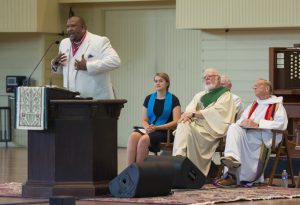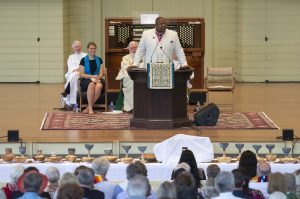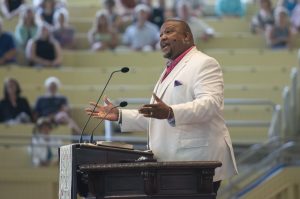
“Our God rains,” said the Rev. David Anderson, referring to the weather, at the 9:15 a.m. Thursday Ecumenical Service in the Amphitheater. His sermon title was “The Power of ‘Authority,’ ” and the Scripture text was Luke 7:1-10.
“Have you noticed that all the titles of the sermons contain ‘A’s — the ‘art’ of inclusion, ‘agreement’, ‘anointing’, ‘alabaster’, ‘authority’ and tomorrow, ‘attitude?’ ” Anderson asked the congregation. “You will have six ‘A’s by the end of the week.”
Anderson said people talk about faith but not always about their faith.
“It is in the power of the personal exercise of faith that we have the authority to affect things on Earth,” Anderson said.
In Luke, a centurion had a sick servant for whom he cared deeply. He sent word to Jesus to come by the house and heal the servant. Then the centurion sent his people to tell Jesus that he did not need to come to the house.
The centurion told his people to say to Jesus, “I am a man under authority, and I understand authority. All you need to do is say the word and my servant will be healed.” Jesus never went to the house and a miracle happened. Jesus said, “I have never seen faith like this in Israel.”
Anderson told the congregation that if we truly have faith, then God is our greatest authority.
“We know him as Lord of Lords, King of Kings, President of Presidents, CEO of CEOs,” he said. “We know him as the one who changes everything. If you have a personal faith in God through Jesus Christ, when you exercise that faith, you move the muscle of the omnipotent God. Without faith it is impossible to please God.”
He called on the congregation to act on their faith when they are fearful.
“I don’t face my fears, I faith my fears,” he said. “I trust God is bigger than what I am afraid of.”
Words are powerful, and with authority, words can make things happen.
“Out of all the miracles, about 50% were by touch and maybe 40% were spoken,” Anderson said. “When God created, he spoke.”
The words must be said in God’s name.

“God said when you ask in my name, I will partner your faith with my ability and it will be done,” Anderson said. “Agreement comes through prayer, but prayer must come through faith that we actually want something to happen.”
Jesus also said that when people pray in his name, he will do what is asked.
“This authority to act is given to all disciples and followers,” Anderson said.
Anderson has known most of the living presidents, and it is not enough to go to the White House and say “I know the president, let me in.”
“Someone with authority has to give you permission to use their name,” he said. “You have to express and activate that permission. You have that authority through Jesus to encourage, bless, speak grace and inspire.”
Anderson shared a story of his own healing. He had gone to the dentist and found after the treatment his jaw was locked. It stayed that way for almost a month. He kept working and went to Kenya to help stop post-election violence.
The bishops he met with wanted to pray over him, and one of them asked for the healing of Anderson’s body.
“I knew I was being healed,” Anderson said. “I believed it and felt the healing, but my jaw did not unlock immediately. It took almost another week. I prayed, I believed, I was healed.”
Between healing and revealing, there can sometimes be a gap, but the bridge between the two, Anderson said, is faith.
“If we live out our Christian faith, the name of Jesus is powerful. It scatters the enemy,” he said. “Under no other name are we given the power to heal, to change the human heart. This is yours today.”

When Anderson was 9 years old, his family moved into a single-family home in suburban Maryland. Their first morning in the new house, they were greeted with a burning cross on the lawn, and someone ran over the dogwood tree in their yard and left tire tracks.
The phone rang that morning and his mother answered it. She listened and then said, “Thank you for calling; God gave us this house and we are not moving.” When Anderson asked who was on the phone, she said, “The welcoming committee.”
Anderson was harassed every day on the school bus by a boy who called him the n-word. One day he lost control as they got off the bus and he got into a fight with the other boy.
“I told him to take it back,” he said. “Mostly we were hitting each other’s arms and chest but I hit him in the nose and there was some blood.”
When Anderson got home, his mother scolded him for fighting and sent him over to the other boy’s house to apologize to the boy and his mother.
“My mother told me I had to forgive even if he didn’t ask for forgiveness,” he said. “I am not sure I would have the power to forgive if I didn’t have Jesus.”
Anderson continued: “I am looking for more fully devoted followers of Jesus to live out their Christian faith to change the world. And let all the cracked pots in Chautauqua say ‘amen.’ ”
Anna Grace Glaize, Christian coordinator for the Abrahamic Program for Young Adults, presided. Robert Vass, a scholarship student with the International Order of the King’s Daughters and Sons, read the Scriptures in Russian and English. He majored in English language and literature at Ferenc Rákóczi II Transcarpathian Hungarian College. The prelude, “Trio from Rio,” based on Brazilian motives and dance styles by Donald Draganski, was played by Barbara Hois, flute; Debbie Grohman, clarinet; and Willie LaFavor, piano. The Motet Choir sang “Christ’s Flock,” by Martin Shaw. Jared Jacobsen, organist and coordinator of worship and sacred music, directed the choir. The Mr. and Mrs. William Uhler Follansbee Memorial Chaplaincy and the Jackson-Carnahan Memorial Chaplaincy provide support for this week’s services.




